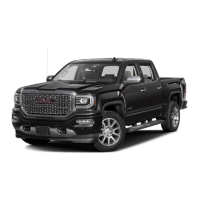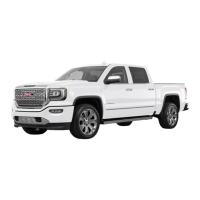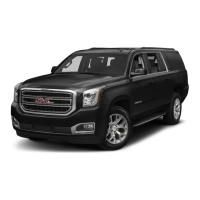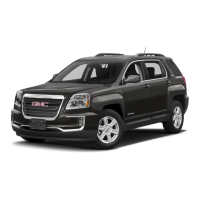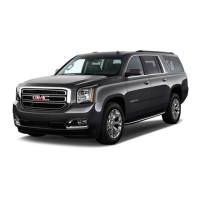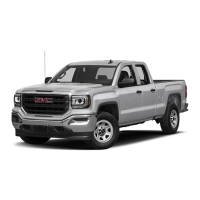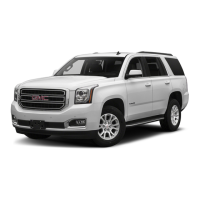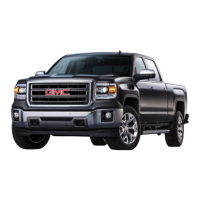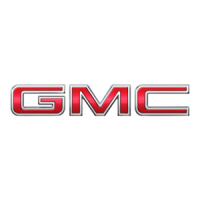Do you have a question about the GMC 2016 Sierra and is the answer not in the manual?
Information for French-language manuals for Canadian owners.
Guidance on how to locate information using the manual's index.
Explains hazard symbols and their meanings for safety.
Describes symbols used in the manual for controls, messages, and indicators.
Lists additional symbols found on the vehicle and their meanings.
Overview of the vehicle's instrument panel layout.
Brief overview of important vehicle features for new drivers.
Details on how the RKE transmitter functions and its operating range.
Explains various methods for locking and unlocking the vehicle doors.
Information on operating power windows, including express features.
Instructions for adjusting manual and power seats, including lumbar support.
Explanation of how to store and recall memory settings for seats, mirrors, and pedals.
How to operate the heated and ventilated seat functions.
Guidance on adjusting head restraints for proper seating position and safety.
Information on using safety belts properly and related sections for detailed information.
Explanation of how the passenger sensing system turns off the front passenger airbag.
How to adjust interior and exterior mirrors for optimal viewing.
Instructions for adjusting the tilt and telescoping steering wheel.
How to adjust the position of the throttle and brake pedals if equipped.
Information on dome and reading lamps, and their controls.
Location and operation of the exterior lamp controls.
How to operate the windshield wipers and washer fluid spray.
System controls for heating, cooling, and ventilation.
Information on range selection mode for the automatic transmission.
How the four-wheel drive system works and its transfer case controls.
Overview of the infotainment system, including radio and audio features.
How to use audio and other controls located on the steering wheel.
How to operate the Driver Information Center using instrument cluster or steering wheel controls.
How FCA helps avoid or reduce harm from front-end crashes.
How LDW helps avoid unintentional lane departures.
How LKA assists in avoiding crashes due to unintentional lane departures.
How RVC displays a view behind the vehicle to aid parking.
How rear parking assist uses sensors to aid parking.
Information on accessory power outlets and their locations.
Using buttons in the overhead console to replace remote transmitters.
Operation of the power sunroof, including vent and express features.
Information on eAssist vehicles, referencing a separate supplement.
How TCS and StabiliTrak systems work to limit wheel spin and assist control.
Explains the Tire Pressure Monitor System (TPMS) and its warning light.
How the engine oil life system calculates and indicates oil change needs.
Information on using E85 or FlexFuel in vehicles with a yellow fuel cap.
Tips on driving habits to improve fuel economy.
Contact information for roadside assistance services.
Information about keys, remote keyless entry, and door locks.
Details on the tailgate and power assist steps.
Information on vehicle security systems, including alarm and immobilizer.
How to adjust and operate exterior mirrors, including power folding.
Adjustment and features of interior rearview mirrors.
Operation of power windows, express features, and window lockout.
Information about the sunroof and its operation.
Instructions for adjusting front seat head restraints for safety.
Details on manual and power seat adjustments, including lumbar support.
Information on folding rear seats for cargo space.
How to use safety belts properly and things not to do.
Comprehensive explanation of the vehicle's airbag system, including types and operation.
Guidance on securing older children and infants in child restraints.
Overview of various storage locations in the vehicle.
How to access and use the upper and lower glove boxes.
Location of cupholders in the front and rear.
How to access the sunglasses storage compartment.
Details on the center console storage, including ports and compartments.
How to access the front seat floor console storage.
Information on cargo tie-downs and their installation.
Overview of steering wheel controls, horn, and wiper/washer operation.
Explanation of various warning lights, gauges, and indicators on the instrument cluster.
Details on the Driver Information Center (DIC) and its menu items.
Explanations of various messages displayed on the DIC.
Operation of exterior lamp controls, including automatic headlamps.
Information on dome, reading, and cargo lamps.
Details on entry lighting, exit lighting, and battery load management.
Overview of the infotainment system and safety precautions while using it.
Explanation of the TheftLock® system for radio security.
General overview of the base radio system and its controls.
Overview of the base radio system with touchscreen controls.
Features and navigation of the base radio home page.
Features and navigation of the base radio home page with touchscreen.
Information on obtaining software updates for the infotainment system.
Operation of AM-FM radio and SiriusXM® service.
Information on CD player, USB port, and auxiliary jack usage.
How to use voice commands for audio and phone applications.
Bluetooth connectivity and phone features for hands-free operation.
Information on connecting and using Bluetooth devices, including phone and media.
Viewing picture and movie files from USB storage or iPod/iPhone.
Viewing movie files from USB storage on the touchscreen.
Legal information regarding trademarks and software licenses.
Operation of heating and ventilation controls.
Operation of heating, cooling, and ventilation systems.
Automatic control of heating, cooling, and ventilation for driver and passenger.
How to use air vents to direct airflow and control the system.
Procedures for replacing the passenger compartment air filter.
Information on servicing the refrigerant system and related components.
General guidance on safe driving practices, including distracted driving.
Procedures for new vehicle break-in and starting the engine.
Information on operating the automatic transmission and its modes.
Explanation of four-wheel drive systems and transfer case operation.
Details on the ABS system, parking brake, and brake assist features.
Operation of Traction Control, StabiliTrak, and Hill Descent Control.
How HDC sets and maintains vehicle speed when descending steep inclines.
How a locking rear axle provides more traction in low-grip conditions.
How to use and set cruise control, including adaptive features.
Overview of features like FCA, LDW, and LKA to help avoid crashes.
Information on fuel types, octane ratings, and filling the tank.
General information and precautions for trailer towing, including equipment and characteristics.
Information on adding electrical equipment and snow plows.
Information on service and parts needs, and GM-trained technicians.
Guidance on performing your own service work and checks.
Instructions on how to open and close the vehicle's hood.
Diagram and identification of engine compartment components.
Information on selecting, checking, and changing engine oil.
How the engine oil life system works and how to reset it.
When to check and change automatic transmission fluid for 6-speed transmission.
When to check and change automatic transmission fluid for 8-speed transmission.
Information on the cooling system and its components.
What to use for engine coolant and how to add it.
What to do if the engine overheats, including protection modes.
Information on the electric and belt-driven engine cooling fans.
Information on checking power steering fluid for 1500 series.
Information on checking power steering fluid for 2500/3500 series.
What to use for washer fluid and how to add it.
Information on disc brake pads, brake fluid, and brake system.
Information on the maintenance-free battery for North America.
Precautions and tips for storing a vehicle.
When to check the lubricant for the four-wheel-drive transfer case.
When to check and change front axle lubricant.
Information on the noise emission warranty and standards.
General information about tires, including maintenance and safety.
Information about all-season tires and their performance.
Considerations for installing winter tires.
Information on the susceptibility of low-profile tires to damage.
Explanation of tire size and designation markings on the sidewall.
Importance of wheel alignment and tire balance for performance.
When to replace wheels, wheel bolts, and nuts.
Step-by-step instructions for changing a tire, including safety precautions.
How to properly store a flat tire, spare tire, and tools.
Step-by-step guide to safely jump-starting a vehicle.
General information and precautions for towing the vehicle.
How to tow the vehicle behind another vehicle, such as a motor home.
Specific instructions for dinghy towing two-wheel-drive and four-wheel-drive vehicles.
Guidelines for maintaining the vehicle's exterior and interior appearance.
How to clean and protect the vehicle's exterior finish.
How to clean the vehicle's interior surfaces, including leather and upholstery.
Importance of proper wheel alignment for tire wear and performance.
How to clean and inspect the windshield for damage.
How to clean and replace windshield wiper blades.
Explains the importance of maintenance for vehicle performance and value.
Schedule of owner checks and services for normal and severe driving conditions.
Services for specific applications like dual wheels and commercial use.
Explains additional services and conditions that may require attention.
Lists recommended fluids, lubricants, and replacement parts.
A template to record service dates, mileage, and work performed.
Overview of customer assistance and satisfaction procedures.
Contact information for customer assistance offices in the US and Canada.
How to report safety defects to government agencies and General Motors.
Information about vehicle computers, EDRs, and data privacy.
Overview of OnStar services, features, and operation.
Information on Vehicle Identification Number (VIN) and its locations.
Information found on the service parts label inside the glove box.
Capacities and specifications for various vehicle systems and fluids.
Diagrams showing engine drive belt routing for different engine types.
| Brand | GMC |
|---|---|
| Model | 2016 Sierra |
| Category | Automobile |
| Language | English |
